
EM Cardiology Course (EMC²)
This 13-hour EM Cardiology Course with Dr. Amal Mattu will help you confidently diagnose and manage a wide spectrum of cardiac presentations seen in the ED.
EMC² is an advanced online course taught exclusively by Dr. Amal Mattu, the national authority on EM cardiology and an award-winning educator.
Purchase the Course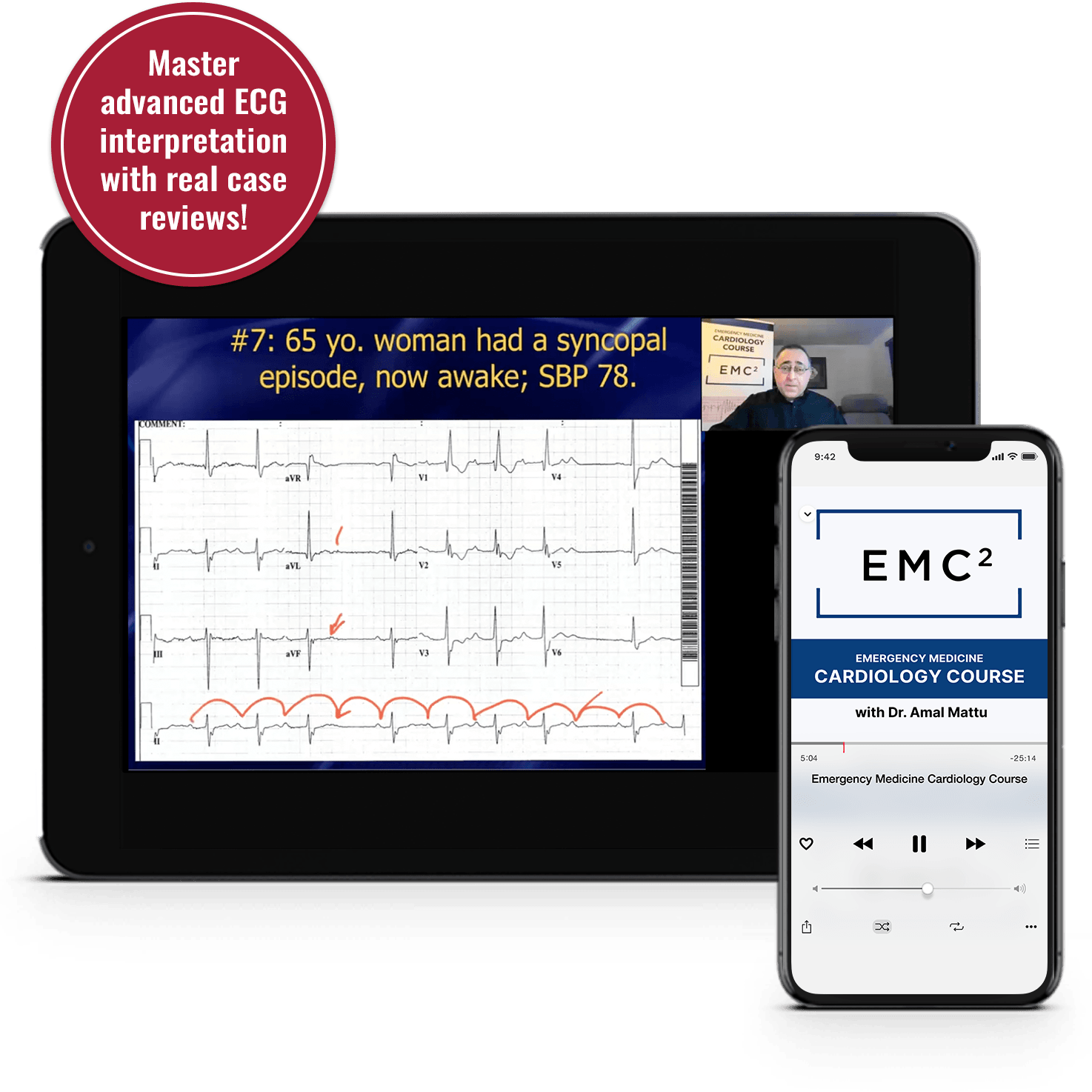
Experience the EMC² Online Course
Using dozens of real cases and their ECGs, Dr. Mattu will focus on the spectrum of serious cardiac presentations seen in the ED. This high-yield, intensive course will take your practice to the next level and provide you with a heightened sense of confidence in the care of your cardiac patients.
A 13-hour deep-dive into emergency cardiology.
Taught by the leading educator of emergency medicine cardiology.
Emphasis on a wide range of real-world clinical cases.
Will take your ability to interpret essential ECGs to the next level.
Enjoyed by over 2,000 prior participants.
Sample Lectures
Instruction by a Master Cardiology Educator
Dr. Amal Mattu is acknowledged as an exceptional emergency cardiology educator. His unique ability to effectively convey information is evidenced by his receipt of over 20 teaching commendations, including ACEP’s ‘Outstanding Contributions to Education Award’.
A Cardiology 'Tour de Force'
This 13-hour course is taught exclusively by Dr. Mattu. Through his cases and numerous ECG examples, you’ll be exposed to the essential nuances of emergency cardiology. Immerse yourself and come away with knowledge you’ll use for the rest of your career.
ECG Machine Readings Can Be Very Wrong
Relying on the ECG machine’s interpretation can be a serious mistake—especially when it comes to arrhythmias, conduction abnormalities, and ischemia. Recognize non-occlusive MIs, SVT with BBB vs. ventricular tachycardia, and wide complex tachycardia where amiodarone can kill.
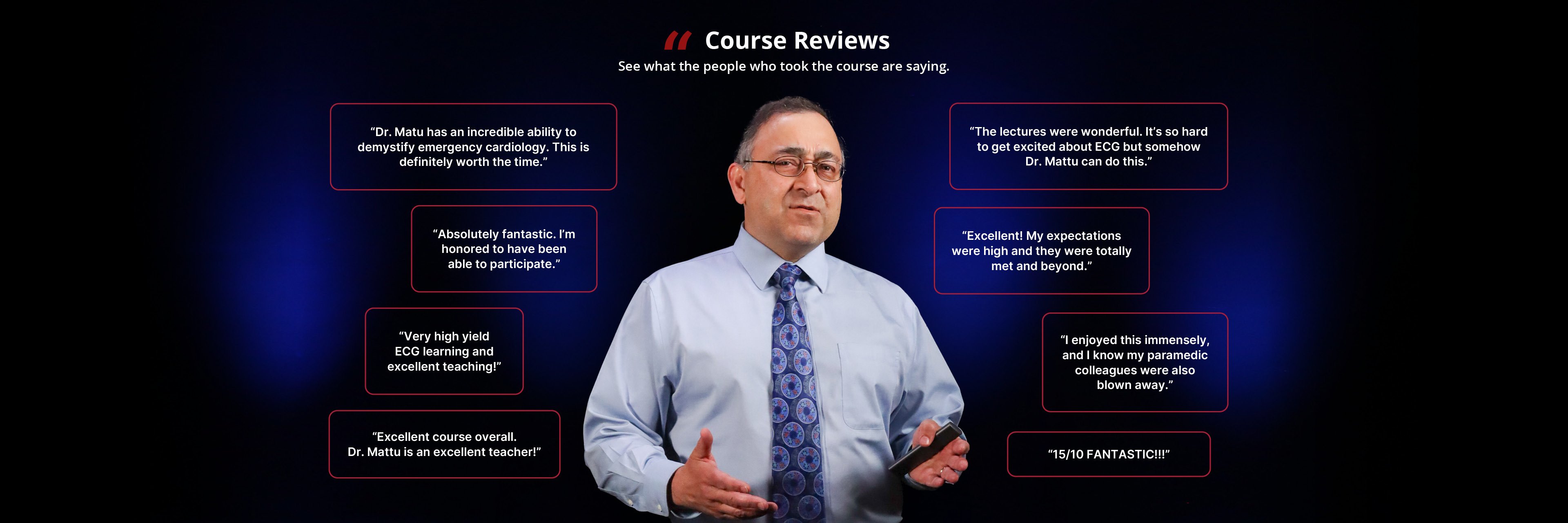
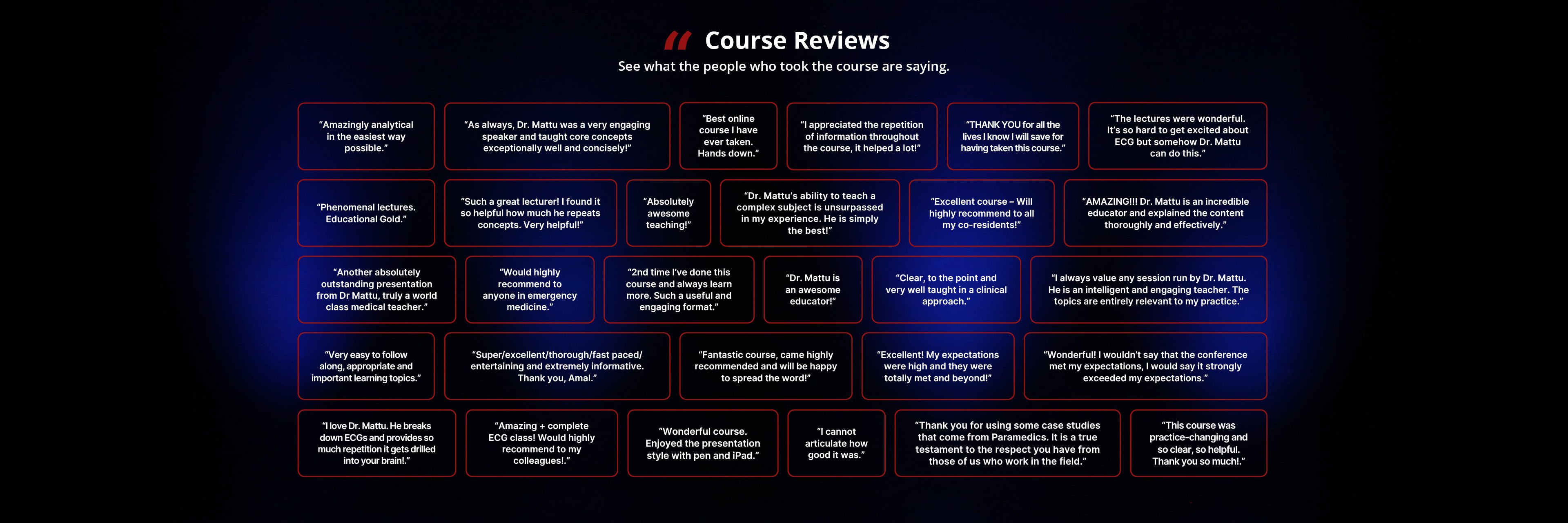
Watch or listen instantly and earn up to 13.00 AMA PRA Category 1 Credits™
EMC² Advanced Topics
Part 1 - EKG of Cardiac Ischemia and ACS ECG Mimics (6-Hour Session)
Part 1 - Course Overview (EKG of Cardiac Ischemia and ACS ECG Mimics)
Presented by Amal Mattu, MD, FAAEM, FACEP
ST Elevation
Presented by Amal Mattu, MD, FAAEM, FACEP
T-wave Changes
Presented by Amal Mattu, MD, FAAEM, FACEP
Reciprocal Changes
Presented by Amal Mattu, MD, FAAEM, FACEP
Sgarbossa Criteria
Presented by Amal Mattu, MD, FAAEM, FACEP
Posterior STEMI
Presented by Amal Mattu, MD, FAAEM, FACEP
aVR
Presented by Amal Mattu, MD, FAAEM, FACEP
deWinter T-waves
Presented by Amal Mattu, MD, FAAEM, FACEP
Hyperacute T-waves
Presented by Amal Mattu, MD, FAAEM, FACEP
STE vs Pericarditis
Presented by Amal Mattu, MD, FAAEM, FACEP
Hypokalemia
Presented by Amal Mattu, MD, FAAEM, FACEP
Benign Early Repol
Presented by Amal Mattu, MD, FAAEM, FACEP
Other STEMI Mimics
Presented by Amal Mattu, MD, FAAEM, FACEP
Hyperkalemia - Part 1
Presented by Amal Mattu, MD, FAAEM, FACEP
Short QT
Presented by Amal Mattu, MD, FAAEM, FACEP
Elevated ICP
Presented by Amal Mattu, MD, FAAEM, FACEP
Wellens Syndrome
Presented by Amal Mattu, MD, FAAEM, FACEP
Part 2 - Dysrhythmias and Syncope (6-Hour Session)
Part 2 - Course Overview (Dysrhythmias and Syncope)
Presented by Amal Mattu, MD, FAAEM, FACEP
Brady and AV Blocks
Presented by Amal Mattu, MD, FAAEM, FACEP
Tachycardias
Presented by Amal Mattu, MD, FAAEM, FACEP
Cases
Presented by Amal Mattu, MD, FAAEM, FACEP
Hyperkalemia - Part 2
Presented by Amal Mattu, MD, FAAEM, FACEP
AV Blocks
Presented by Amal Mattu, MD, FAAEM, FACEP
Atrial Flutter
Presented by Amal Mattu, MD, FAAEM, FACEP
MAT
Presented by Amal Mattu, MD, FAAEM, FACEP
Artifact
Presented by Amal Mattu, MD, FAAEM, FACEP
SVT
Presented by Amal Mattu, MD, FAAEM, FACEP
Grouped Beats
Presented by Amal Mattu, MD, FAAEM, FACEP
Narrow Complex Tach
Presented by Amal Mattu, MD, FAAEM, FACEP
V Tach or Not - Part 1
Presented by Amal Mattu, MD, FAAEM, FACEP
V Tach or Not - Part 2: Lewis Lead
Presented by Amal Mattu, MD, FAAEM, FACEP
V Tach or Not - Part 3: Adenosine Pitfalls
Presented by Amal Mattu, MD, FAAEM, FACEP
STEMI Mimics WCT
Presented by Amal Mattu, MD, FAAEM, FACEP
Accelerated Idioventricular Rhythm
Presented by Amal Mattu, MD, FAAEM, FACEP
A Fib with WPW
Presented by Amal Mattu, MD, FAAEM, FACEP
Hypertrophic Cardiomyopathy
Presented by Amal Mattu, MD, FAAEM, FACEP
Brugada Syndrome
Presented by Amal Mattu, MD, FAAEM, FACEP
Long QT
Presented by Amal Mattu, MD, FAAEM, FACEP
Arrhythmogenic Cardiomyopathy
Presented by Amal Mattu, MD, FAAEM, FACEP
Course Faculty
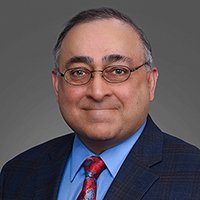
Amal Mattu, MD, FAAEM, FACEP
Professor and Vice Chair; Director
Emergency Cardiology Fellowship Department of Emergency Medicine
University of Maryland School of Medicine
Baltimore, MarylandDr. Amal Mattu has had a passion for teaching and writing about emergency cardiology since he joined the faculty at the University of Maryland School of Medicine in 1996. He has authored or edited 26 textbooks in emergency medicine, including ten focused on emergency cardiology and electrocardiography. He has also served as primary Guest Editor for Cardiology Clinics three times. He lectures nationally and internationally on emergency cardiology topics and has helped to create and direct multiple conferences, podcasts, and videocasts focused on this area. He has delivered over 3,000 hours of CME and has received more than 20 teaching awards, including ACEP’s highest honor for education, the ‘Outstanding Contributions to Education Award’, and was appointed as ‘Distinguished University Professor’ in 2025 by the University of Maryland School of Medicine. Dr. Mattu is currently a tenured Professor, Vice Chair of Academic Affairs, and Director of the Emergency Cardiology Fellowship for the Department of Emergency Medicine at the University of Maryland School of Medicine.
Expand your knowledge of ECG interpretation and ED related cardiac presentations with Amal Mattu, MD
Learn on your own time and at your own pace
With on-demand access across your phone, tablet, and computer, you can complete the ECG course whenever and wherever it’s most convenient.
Purchase the Course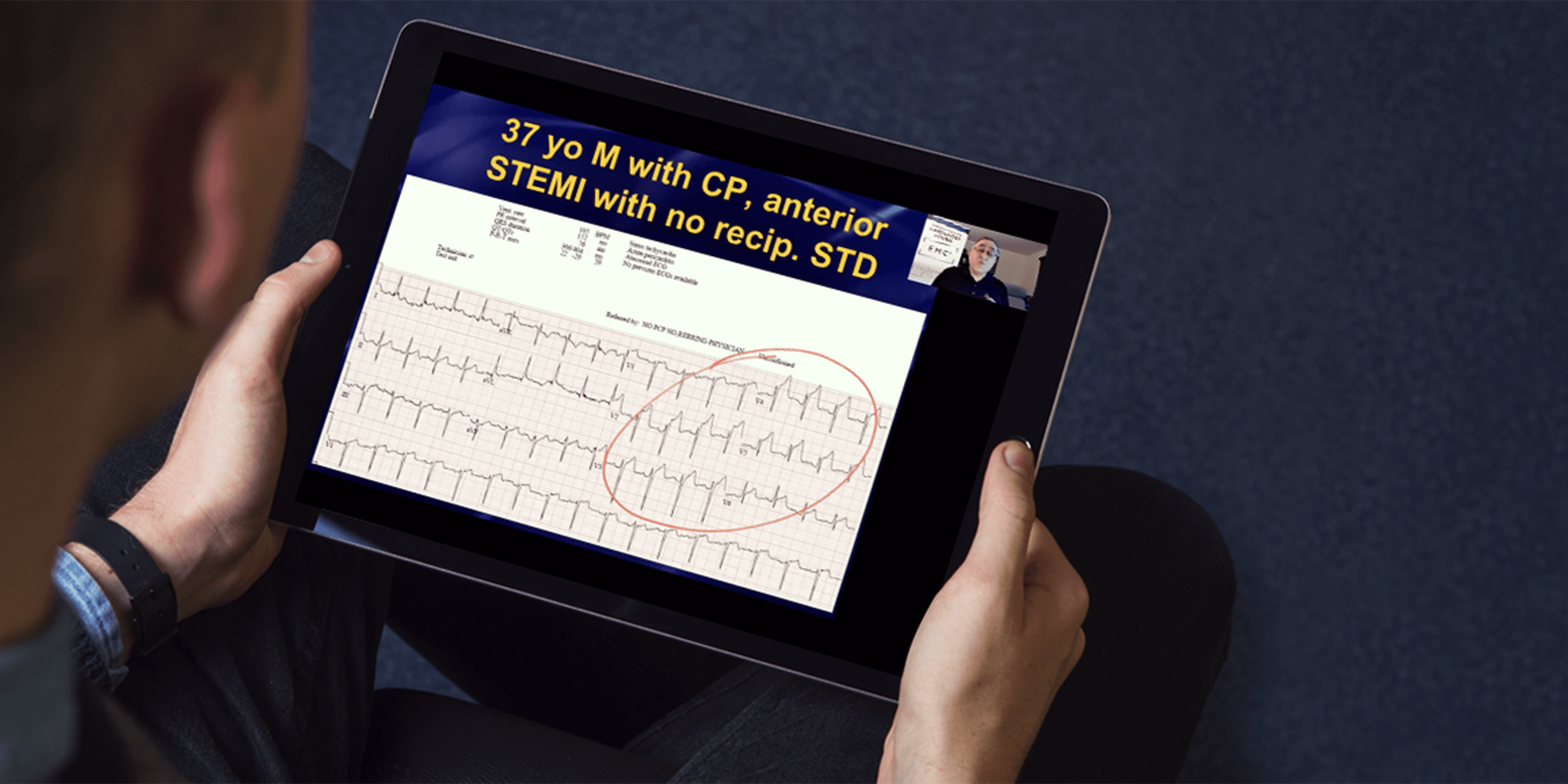
Self-Study CME Accreditation
No commercial support was obtained for this program.
This activity has been planned and implemented in accordance with the accreditation requirements and policies of the Accreditation Council for Continuing Medical Education through the joint providership of the Center for Emergency Medical Education and The Center for Medical Education, Inc.
The Center for Emergency Medical Education is accredited by the Accreditation Council for Continuing Medical Education to provide continuing medical education for physicians.
The Center for Emergency Medical Education (CEME) designates this enduring activity for a maximum of 13.00 AMA PRA Category 1 Credits™. Physicians should claim only the credit commensurate with the extent of their participation in the activity.
The Center for Medical Education, Inc. is approved by the California Board of Registered Nursing, Provider #12345, for 13 Contact Hours.
The AOA automatically recognizes AMA PRA Category 1 Credit™ as AOA Category 2 credit.
Both PA and NP organizations recognize AMA PRA Category 1 Credit™ as approved CME.
CME Expiration Date: May 15, 2027
Target Audience
The EM Cardiology Course (EMC ²) course is intended for emergency and urgent care physicians, PAs, NPs, and any other healthcare professionals who may have an interest in the topic.
Learning Objectives
At the conclusion of this enduring activity, participants will be able to:
Be able to elucidate the key anatomic structures involved with cardiac dysfunction.
Describe the mimics of the acute cardiac syndrome.
Describe the key steps involved with successful EKG interpretations.
Effectively differentiate the ischemic from the nonischemic EKG.
Elucidate the recognition and treatment of the various cardiac arrhythmias.
Name and describe the common mimics of the various cardiac arrhythmias.
Describe the essential differences between supraventricular and ventricular arrhythmias.
Describe the key elements in the approach to the potential cardiac patient.